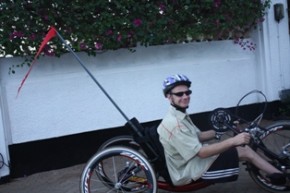The pace of both life and traffic can be surprisingly slow in Dar es Salaam, as I’m learning through a dawn commute into the DFID office. While it’s great to be alongside the Indian Ocean, sitting in jams for hours isn’t so appealing! I’ve resorted to hand-cycling to work on some days, despite erratic driving styles and a monster pothole that gave me two punctures on my first day.

Historically, Tanzania has been considered less dynamic in comparison to its east African neighbour Kenya - both in its economy and school system. In education terms the secondary school enrolment rates were below 10% until only a decade ago. This has tripled in recent years as DFID and other development partners backed the Government’s expansion plan with budget support to help finance new schools and additional teachers.
As has been observed elsewhere in the east African region - such as Uganda when it abolished primary school fees in the 1990s - the ‘growing pains’ of rapid expansion has manifested itself in congested classrooms, inadequate skilled teachers and very low examination rates; less than 10% of candidates got a Division I-III pass in the Form IV secondary examinations in 2011.
One aspect in which Tanzania is anything but sleepy is in the sphere of citizen’s accountability around education and broader delivery of social services. A combination of savvy Tanzania advocacy champions and development partner support has enabled mass children literacy and numeracy surveys, which are completely autonomous from the school system.
Twaweza, is a citizen-centered initiative supported by the UK Government, focusing on large-scale change in East Africa. The name is a kiswahili word that means “we can make it happen”. They have supported the rollout of learning surveys known as the Uwezo initiative in Tanzania. The idea originated in India, where the Pratham movement introduced community run tests and present a massive national report to government annually. Comparable data has also been collected in Kenya and Uganda and the findings present disturbingly low levels of competencies amongst children. Results also vary enormously between countries and between regions, districts and schools, this also generates huge interest in the underlying factors that drive real learning and what should, or should not be, going on in schools.
The theme for this year's global Blog Action Day, on the 15th October, is 'the power of we'. Twaweza is just one example of the 'power of we' in action - citizens using data to hold governments to account. The findings of course raise alarm bells, activists and some parliamentarians in the Bunge now challenge the status quo and highlight the need for major education reforms. Some elements of the Government dispute the findings and validity of the Uwezo tests, but the data does seem to confirm the failings outlined in government documents further down the assembly line of Tanzanian education - low pass rates and a dearth of skilled labour.
I think Uwezo’s approach has the potential to spread further in Africa and assist everyone involved in education to focus on the product – children with demonstrable skills, rather than the money, teachers and books that are input into the system. A lot of thinking is now going into the next generation of MDGs - international post-2015 targets. Almost inevitably they will need to reflect this tide of opinion - that it’s the learning going on that counts.
Open Up!
Next month DFID is co-hosting (with the Omidyar Network) an exciting conference called Open Up!, which will help governments use technology to open up and enable millions of citizens across the world to hold decision makers to account and change lives. Entrepreneurs, government and civil society will come together to galvanise action in the fast-growing field of open government, to show how web and mobile technologies can drive more engagement of citizens in government and showcase entrepreneurs’ innovations and experiences from around the world (more details to come in my next blog). You'll be able to join in at www.openup12.org or by following #OpenUp12 on Twiter.

3 comments
Comment by Lucy posted on
I completely agree with the inter-linked pillars that you put forward here - in terms of civil engagement in the governance of education to ensure improved accountability to the system's 'clients', and in the focus on the outcomes of education and the relevance of the skills/qualities that young people attain.
Comment by Amy Jensen posted on
I am so excited to see people interested in education in Africa. Education in this country is absolutely crucial to providing great improvement in the quality of life for these people. I work for a nonprofit in Africa that helps provide education to children who would otherwise not have this great opportunity. I believe this approach can spread, I think the theme "the power of we" is great and so true.
Comment by Tanzania’s Pass/Fail Roller Coaster | DevEd Community Blog posted on
[...] learning at school (or elsewhere). Clearly examination pass rates are one measure of learning; as posted earlier, other approaches such as civil society led testing of children on basic literacy and numeracy [...]